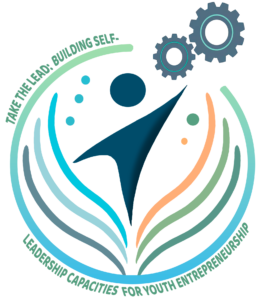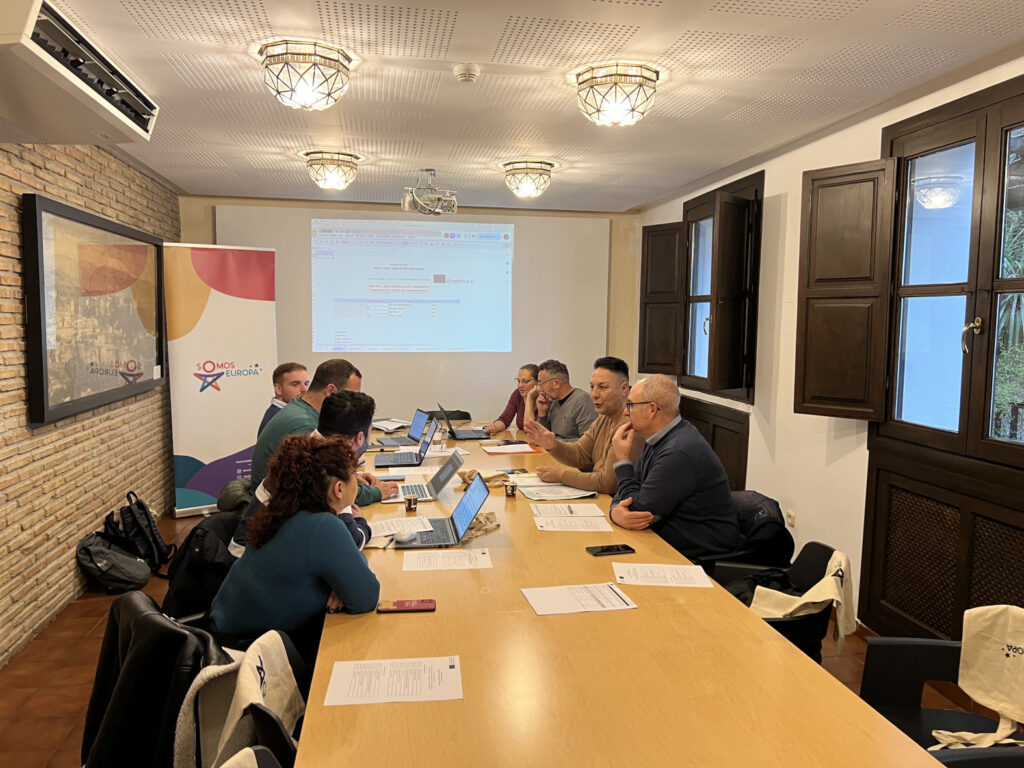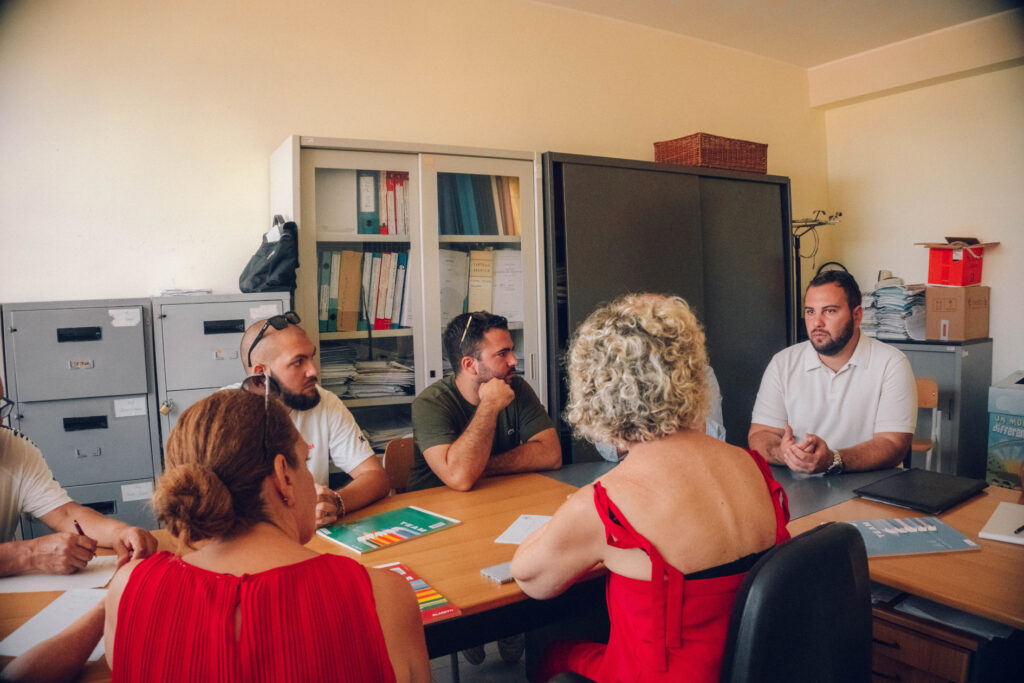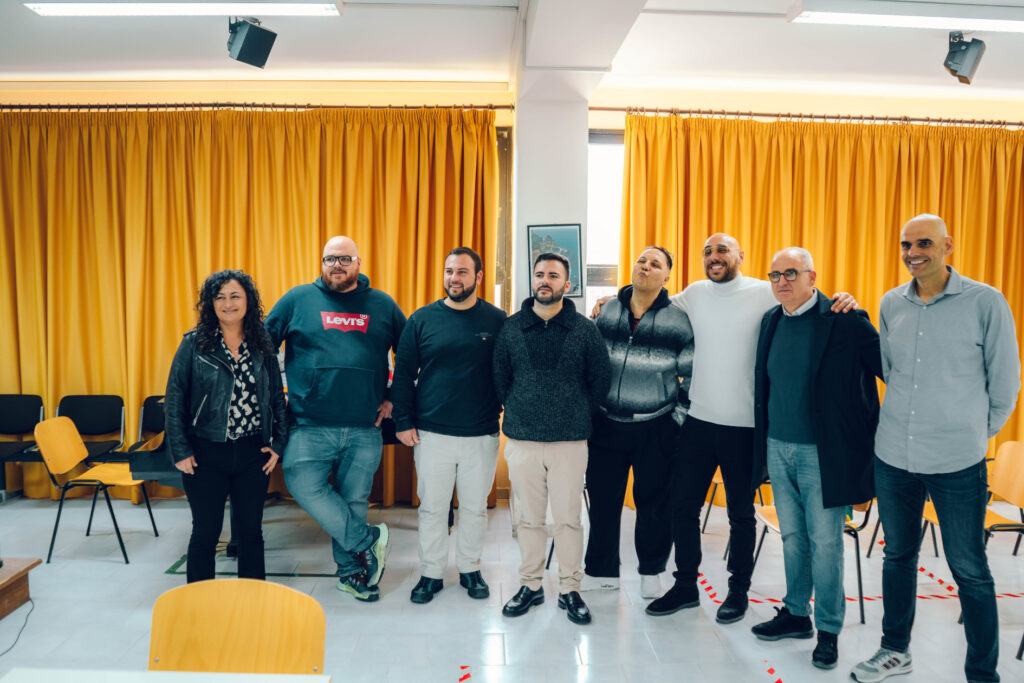
Take the Lead: Building Self-Leadership Capacities for Youth Entrepreneurship.
The ‘Take the Lead: Building Self-Leadership Capacities for Youth Entrepreneurship’ project is an initiative funded by the European Commission through the Erasmus+ programme, designed to provide continuous training to trainers in the field of entrepreneurship in order to inspire students on the subject of self-leadership.
This project, part of the Small-Scale Partnerships (KA210) programme, has enabled the creation of valuable materials and the development of various activities implemented in Spain and Italy. Thanks to the collaboration of these countries, the project has promoted significant improvements in the field of entrepreneurship, providing tools and tailored training that promote the autonomy and participation of young people in entrepreneurship.
Objectives
The main objective of the project ‘Take the Lead: Building Self-Leadership Capacities for Youth Entrepreneurship’ is to train trainers and youth workers so that they can inspire and guide students in developing self-leadership skills and entrepreneurial spirit. The aim is for trainers to acquire and pass on practical tools that enable young people to face the challenges of the labour market with greater autonomy and resilience.
Another objective is to strengthen the capacity of trainers to adapt their methodologies to the specific needs of students, especially in relation to career guidance and labour market demands. This involves deepening knowledge of the cognitive, emotional, social and relational dimensions of entrepreneurship, thus enabling young people to develop a more comprehensive view of themselves and their possibilities for professional integration.
The project aims to promote collaboration and the exchange of good practices among trainers from different sectors and disciplines, creating a community committed to innovation and continuous improvement in vocational training. In this way, it seeks to multiply the impact of the project, contributing to positioning self-leadership as a key competence for the future of young people and European companies.
Target Groups
The ‘Take the Lead: Building Self-Leadership Capacities for Youth Entrepreneurship’ project targets several key groups.
Trainers and youth workers
The project is primarily aimed at trainers and youth workers who play a key role in the education and guidance of young people, especially in rural and remote areas of Andalusia and Calabria. These professionals accompany vocational training students in their personal and professional development, and the project aims to provide them with specific tools and skills in self-leadership and entrepreneurship. The continuous training they receive will enable them to adapt their methodologies and offer higher quality support, responding to the current needs of the labour market and the demands of young people.
Vocational Training Students
Improvements in trainer training have a direct impact on the quality of training received by young people, especially those who are disadvantaged or live in areas with fewer opportunities. Thanks to the project, students will have access to more tailored and up-to-date training, enabling them to develop key skills for entering the labour market and participating actively in society.
Youth organisations
The project also targets youth organisations working in the field of non-formal education and career guidance. These entities, especially in rural areas, seek to become role models and mentors for young people, supporting them in their development as active and committed citizens. The project promotes collaboration between vocational training centres and youth organisations, facilitating the exchange of good practices and the creation of support networks that contribute to the comprehensive development of young people.
Companies and agents in the business sector
Finally, the project considers companies and other business sector agents as key target groups. It seeks to promote collaboration between educational centres and companies in order to adapt curricula to the demands of the labour market and encourage the professional integration of young people. The project aims to create synergies that enable the development of cross-cutting skills and the formation of a community committed to self-leadership and entrepreneurship among future professionals.
PARTNERS
This project is being developed thanks to the collaboration of a consortium of organisations that contribute their experience and knowledge in different fields related to education, vocational training and youth work. International cooperation between Andalusia (Spain) and Calabria (Italy) is essential to the success of the initiative, enabling the exchange of good practices and the creation of innovative solutions tailored to the needs of young people in rural and remote areas.
Instituto de Educación Secundaria Los Montecillos
IES Los Montecillos is the applicant and coordinating centre for the project. It is a leading public school in the Guadalhorce Valley region, offering compulsory secondary education in a bilingual format, upper secondary education, and basic and advanced vocational training in IT and communications, as well as an advanced course in multi-platform application development. The centre stands out for its commitment to improving educational quality, including students with fewer opportunities and methodological innovation, actively participating in European programmes such as Erasmus+ and initiatives to promote entrepreneurship and autonomy among young people. The school has extensive experience in integrating foreign and Roma students and develops innovative actions to motivate students and prevent school dropouts.
Somos Europa
Somos Europa is a non-profit association whose mission is to facilitate access to educational and cultural resources for disadvantaged young people. Its work focuses on non-formal education and youth participation, promoting social inclusion and the development of key skills such as communication and critical thinking. The association collaborates with educational centres and local councils in the province of Granada, organising activities such as camps, youth meetings and leadership workshops. Its inclusive approach and experience in European projects make it a key partner for the dissemination of the project and the training of young leaders.
Istituto Tecnico Industriale e Geometra (ITI-ITG)
The ITI-ITG in Vibo Valentia is a technological vocational training centre offering a wide range of courses in areas such as engineering, IT, mechanics, agriculture and surveying. The centre stands out for its practical approach, with numerous hours of laboratory work and projects in collaboration with local companies and non-governmental organisations. The institute actively participates in regional and national events and offers career guidance and entrepreneurship training for students, mainly from rural areas with limited opportunities. Its experience in preparing young people for the labour market and its commitment to educational innovation reinforce the international dimension and the transfer of good practices of the project.
High on Life
High on Life is a non-governmental organisation dedicated to promoting cultural, educational and youth participation activities in the Calabria region. Its team, made up of professionals with extensive experience in intercultural learning and international projects, organises workshops, cultural and sporting events, and mentors young people and new local groups. The association encourages volunteering and active citizenship, involving the local community and promoting the participation of young people in European projects. Its innovative approach and network of international partnerships add value to the project, facilitating the dissemination of results and the exchange of experiences between young people from different countries.
MEETINGS
Kick of meeting
The kick-off meting of the project “Take the Lead: Building Self-Leadership Capacities for Youth Entrepreneurship” was held in Granada, Spain, with the participation of all partner organisations. During this meeting, the foundations for collaboration were established, key objectives were defined, and the main activities to be developed throughout the project were planned. This initial encounter was essential to align expectations, clarify roles and responsibilities, and set a joint working framework for the 18-month duration of the project. The meeting also provided an opportunity to discuss the specific needs of the target groups and to ensure a shared understanding of the project’s vision and expected impact.

Transnational Training in Italy
A central milestone of the project was the transnational training event held in Italy. This meeting brought together VET trainers and youth workers from Spain and Italy to participate in practical workshops focused on self-leadership, decision-making, strategic thinking, and emotional management. The training facilitated the exchange of methodologies and best practices, while also strengthening professional networks among participants. The knowledge and skills acquired during this session formed the basis for the subsequent implementation of the educational itinerary in each country.

National Pilots and Local Activities
Following the transnational training, each partner organisation implemented the developed educational itinerary in their respective VET centres. These national pilots allowed for the practical application and adaptation of the project’s methodologies to local contexts. Additionally, study visits to local companies were organised to provide young participants with direct exposure to real-life examples of leadership and entrepreneurship.

Final Evaluation Meeting in Italy
The final evaluation meeting took place in Italy, gathering representatives from all partner organisations. The purpose of this meeting was to review the results achieved, share experiences and lessons learned, and discuss the sustainability and potential transferability of the project’s outputs. The meeting concluded with the preparation of the final report and the identification of future collaboration opportunities.
Intelectual outputs
Entrepreneurial Self-Leadership Research and Analysis
A comprehensive analysis of entrepreneurial self-leadership among young people in rural areas of Andalusia and Calabria was carried out. This study identified needs, barriers and opportunities, and served as a basis for designing training materials and activities tailored to the participants’ circumstances. The results enabled the project to be geared towards greater impact and relevance for the young people and trainers involved.
Inglés:
https://drive.google.com/file/d/1KntJG_gp_6ePGSmyz5HH-IVh4ltOoDCR/view?usp=drive_link
Español:
https://drive.google.com/file/d/1Mqon_cHO_hYB8sNhO4yCu_NXuMFsBlAM/view?usp=drive_link
Italiano:
https://drive.google.com/file/d/1pJ5Z-FcCpMMfH-e1oxiow4_9sgMwmDXN/view?usp=drive_link
Pilots Training
National pilot programmes were carried out in vocational training centres in Spain and Italy, where the training programme developed on self-leadership and youth entrepreneurship was implemented. These sessions allowed the materials and methodologies to be put into practice and adapted to the real needs of the young participants, validating their usefulness and gathering valuable lessons for future editions.
Inglés:
https://drive.google.com/file/d/1NQrQOJz0qIbo8fIeqviX5uT1fpCnIpgd/view?usp=drive_link
Español:
https://drive.google.com/file/d/1jXHfaNyfiDbvdNCqq2oKTtFZ0KGXscZ8/view?usp=drive_link
Italiano:
https://drive.google.com/file/d/1AUVMdzfbBt4c7Fqi5hL7hTdsN8UnhTX4/view?usp=drive_link
Pilots Training Experience
The implementation of national pilot projects in Spain and Italy allowed us to verify the effectiveness of the training programme in real-life situations. The young participants responded positively to the practical methodologies and content on self-leadership and entrepreneurship. In addition, direct interaction with local companies enriched the experience, bringing the training closer to the professional world. The pilot sessions served to gather suggestions, adapt the materials and confirm the value of the proposed approach for the personal and professional development of young people.
Inglés:
https://drive.google.com/file/d/1MYrqjI-zQdQzSlojz_ED8VTyRoyvRG1l/view?usp=drive_link
Español:
https://drive.google.com/file/d/1iIU8pEc67QwyHQM-LELUmV0TJr_gLvN5/view?usp=drive_link
Italiano:
https://drive.google.com/file/d/1AVpAhwciFBcKt_9-EmD_BFhtKz3x9_GW/view?usp=drive_link
Final Project Report
This final report, prepared collaboratively by the partner organisations, outlines the achievements made, any deviations from the plan and a series of proposals for transferring and scaling up the project results. The evaluation was designed as a cross-cutting process that accompanied all stages, enabling informed decisions to be made and ensuring the quality and relevance of the work carried out.
Inglés:
https://drive.google.com/file/d/16uUfjCeHzUWuruQtqMFetuRyjQsiHkg8/view?usp=drive_link
Español:
https://drive.google.com/file/d/1O9Hbk0emYz9gj4KlLqnNQyHT-dWpgNdc/view?usp=drive_link
Italiano:
https://drive.google.com/file/d/1pi2X_RSnv2aru4Utact642nrYB7duAOB/view?usp=drive_link
